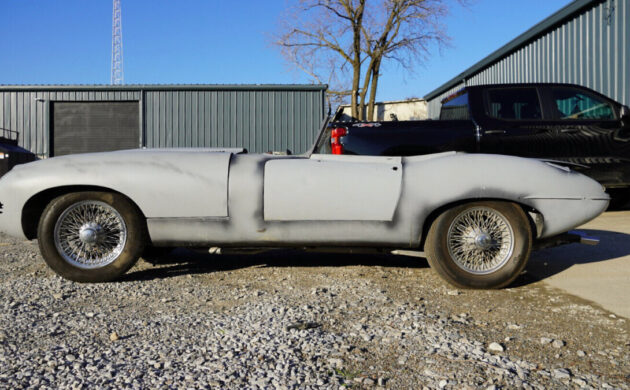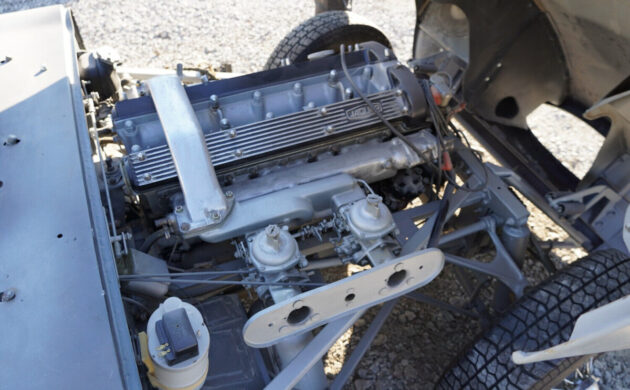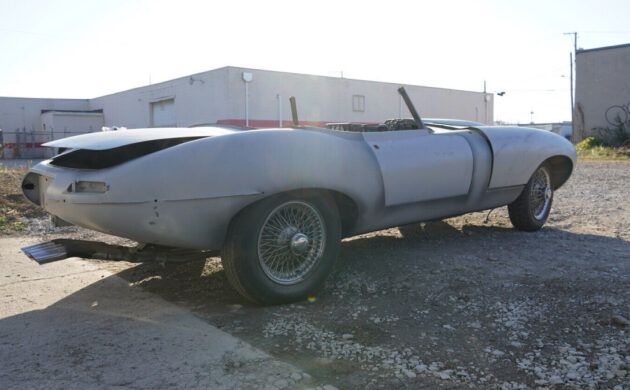Needs Finishing: 1968 Jaguar E-Type Roadster
The Jaguar E-Type is one of the most beautiful cars ever created, and it developed a reputation for three things. The first was its stunning appearance. The second was its ability to make the best use of what many would consider modest engine power to provide impressive performance. Sadly, its third attribute was a reputation for developing major rust issues, and we’ve seen a few sad examples over the past decade at Barn Finds. However, this car stands out as an unfinished project where the owner commenced their restoration with a solid vehicle. It is basically complete, but it needs someone to add the finishing touches. The E-Type is listed here on eBay somewhere in Ohio. The seller set their auction to open at $47,000, but there have been no bids. I must say a big thank you to Barn Finder T.J. for spotting this British classic.
During its production life, it is recognized that Jaguar produced the E-Type in three distinct series. However, there was also an unofficial fourth version featuring evolutionary changes called the Series 1½, which rolled off the line in late 1967 and early 1968. This is one of those cars, and the updates, like the different carburetors and dash switches, remain intact. The seller indicates the present owner purchased the car around seven years ago and commenced a restoration which has stalled. Two important points worth noting made this classic a prime project candidate. The first was there was no evidence of previous accident damage or repairs. The more important factor was its lack of significant rust. There were a couple of small areas in the floors, which they addressed before seam sealing the floors to prevent a reoccurrence. There were the usual spots around the hood hinge plates and headlights, which they repaired. Externally, these repairs look excellent. There is some tidying up for the new owner to perform under the hood, but that is a minor consideration. Otherwise, the panels require little preparation before someone applies a fresh coat of this classic’s original Opalescent Silver Gray paint. The seller indicates that any parts not attached to the car are packed and ready for shipment, so whipping the interior into shape seems to require little beyond fresh paint and the painstaking process of reassembly.
As with this Jag’s exterior, any missing parts required for interior reassembly are included. However, this aspect of the build could prove one of the more expensive because it requires a total retrim. Even though Jaguar only produced 2,801 examples of the Series 1½ Roadster, kits returning it to its former glory remain readily available. They are hardly cheap, but a kit consisting of upholstery in the correct Black leather will be easy to find for around $6,000. That’s hardly chicken feed, but the results and potential value of this classic justify that outlay. Components like the wheel and dash look excellent, and I can’t spot any aftermarket additions.
The phasing in of the Series 1½ E-Type brought a couple of mechanical changes, with the most notable being the swap from triple SU carburetors to a pair of Zenith-Strombergs. This change slightly reduced the power output of the beautiful DOHC 4.2-liter six-cylinder engine, but buyers found the reduction hard to detect. That sweet six sent 266hp to the rear wheels via a four-speed manual transmission, allowing this classic to storm the ¼ mile in 14.9 seconds before winding its way beyond 140mph. The seller indicates this E-Type is numbers-matching and that it ran and yard drove until a few years ago. It seems it was in mechanically good health. Still, potential buyers will probably elect to perform a thorough inspection and refit items like the radiator and fans before coaxing it back to life. It will almost certainly require brake work and the replacement of some perishable items, but I feel that a competent new owner could perform most of the tasks in a home workshop.
When an unfinished classic restoration project has a price nudging perilously close to $50,000, it stretches credibility to describe it as affordable. That is the case with this 1968 Jaguar E-type, but the price would seem justified. Although the early Series 1 examples command the highest prices, there is no reason why this car shouldn’t achieve a value beyond $100,000 if its new owner finishes it to a high standard. It is also worth noting that with values continuing to climb steadily, the buyer could find themselves behind the wheel of one of the most beautiful cars ever built, which is also an appreciating asset. That sounds like a win/win situation to me.
Auctions Ending Soon
 2002 Subaru Impreza WRXBid Now10 hours$333
2002 Subaru Impreza WRXBid Now10 hours$333
 1975 Chevrolet Corvette ConvertibleBid Now11 hours$4,000
1975 Chevrolet Corvette ConvertibleBid Now11 hours$4,000
 1964 Ford F-100 Camper CustomBid Now12 hours$2,000
1964 Ford F-100 Camper CustomBid Now12 hours$2,000
 2006 Jeep Wrangler SportBid Now2 days$11,000
2006 Jeep Wrangler SportBid Now2 days$11,000
 1974 Datsun 260ZBid Now4 days$750
1974 Datsun 260ZBid Now4 days$750






Comments
Auto journalist Henry N. Manney III dubbed it “the greatest crumpet-catcher known to man.”
47 large and it doesnt run?? This looks like a money pit. You would have to have an expert look it over good and see if the body work is good or if its full of mud. I’ll refrain from the Lucas electrical system jokes. Even if the body work is good you still have a long way to go. buying a car in somebody else’s primer scares me to death. Good luck.
Cheers
GPC
Seems perfect for somone with the know-how, interest and drive. Usually when they are painted, it tends to be the wrong color for so many.
It would be easy to set tri-SU’s in place of the emission S-Bergs, finish up the needy bits and use it.
Very difficult car to work on, especially when replacing everything taken off for bodywork. Did that once and have never done it again.
The author says : “…ability to make the best use of what many would consider modest engine power ” – are you serious?
265 bhp out of a 3,781 cc , 230.7 cu-inches = 1.15 horsepower per cubic inch. That was the standard engine that came with the car. compares very favorably to the most powerful muscle car motors available – like a 426 street hemi, or a 427 Ford big block, both able to just about manage 1 horsepower per cubic inch?
Is this the red one we had here a few weeks ago where a tree
felt on? (with a bent frame and lots of rust?
Some smart one bought it welded and primered it and tries
yet to sell it with huge profit ….?!
Uh, no. Those were Ser. II cars.
It would be interesting to watch that 3.8 on a dyno and see if it could really pump out over 260 HP, I’m sure the Hemi would do more than 1 HP per cube even in street tune. There is an old drag racer with a 427 Thunderbolt that is doing 9 second 1/4 miles claiming he’s getting nearly 2 HP per cubic inches, of course it’s a bit modified. Anyway 30K tops for this car…
A ’68 would have a 4.2 liter 6. The 3.8s were discontinued in favor of the 4.2 in ’65.
The write-up says 4.2 liter- that’s in the 255-258 cid range, IIRC.
Still if you’re making more HP than the same number Cubic Inches with which you’re making it, you’re making decent air flow, which is what a Hemi Head does best.
I’ve casually wondered whether parts could be interchanged between the AJ-6 and the 3.5/3.8/4.2 DOHC sixes and could the older engines be improved upon.
@pwtiger. yeah. true enough. factory stated power/torque figures not always truly credible or even consistent between two different cars. I remember reading that the power outputs for the Triumph Dolomite Sprint 2.0 16-valve engines varied so much from the factory, that the official published rating was 127 bhp but some had closer to 150 straight from the factory…and the “gross” horsepower ratings were never truly representative.
Also true that there are known examples of Ford or GM deliberately understating the power of some of their highest performance V8s on occasion, especially as the pressure of insurance premiums took effect in the early seventies?
I remember many years ago waiting on a line to attend an event and a skinny, shirtless man drove up in an early e-type as dingy as this, to drop someone off. Even in that condition, the car drew attention and admiration from onlookers.
Needs finishing or needs beginning?
If engine, trans ,and rear end are good to go its a fair buy. Amatuer reassembly? Not a good idea. Top and interior in SoCal by THE Jag upholsterer? $12k out the door perfect!$$$! Recently had it done. Well worth it.
Retail junk price. pass not worth the cost to finish.
Not sure how many XKE restorations George has done recently but I have done several and I think this can be finished for under $120 K all in without turning a screw by the owner. Well under market ‘retail’ and hardly junk! Just my …VERY qualified opinion?
Not sure how many XKE restorations George has done recently but I have done several and I think this can be finished for under $120 K all in without turning a screw by the owner. Well under market ‘retail’ and hardly junk! Just my …VERY qualified opinion?
You would have to pay me to take that nightmare.